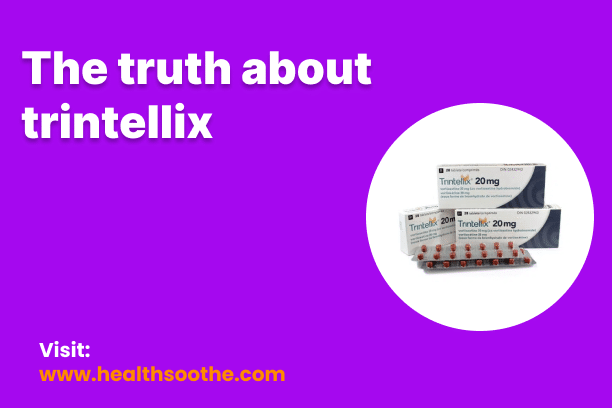Trintellix (vortioxetine) is a medication branded for the treatment of major depressive disorder. It is administered orally in tablet form, usually once daily. The prescribed dosage may differ based on individual symptoms and adverse reactions.
Trintellix is categorized as an atypical antidepressant and does not have a generic counterpart available.
The Truth About Trintellix
Trintellix, an antidepressant prescribed for major depressive disorder (MDD), functions by inhibiting the reuptake of serotonin and norepinephrine, both pivotal neurotransmitters in mood regulation. Elevating these neurotransmitter levels in the brain, Trintellix alleviates depression symptoms.
Individuals with MDD unresponsive to other antidepressants are prime candidates for Trintellix, which also addresses anxiety, chronic fatigue, and various mood disorders. It can be used alone or alongside other medications.
Trintellix, available in 25 mg, 30 mg, or 40 mg doses, may be adjusted to 5 mg daily if side effects occur. Despite its efficacy in mitigating MDD symptoms within 12 weeks, Trintellix is comparatively well-tolerated and has a short half-life.
Nevertheless, potential side effects like nausea, vomiting, insomnia, headaches, and sexual dysfunction, including decreased libido and difficulty orgasming, should be discussed with a healthcare provider. Weight gain's association with Trintellix remains inconclusive, although some individuals have reported increased weight while taking it.
Alcohol consumption while on Trintellix requires caution due to enhanced effects and exacerbation of depressive symptoms. As with any medication, individual responses to Trintellix vary, necessitating thorough discussion of benefits versus risks with healthcare professionals.
Trintellix offers an effective MDD treatment with minimal side effects. However, its interactions with other substances and medications mandate careful consideration and consultation with healthcare providers before use.
Read Also: L612 Pill White Oval 8mm - Pill Identifier
Pros and Cons of trintellix
Pros of Trintellix:
- Effectiveness
- Low Incidence of Side Effects
- Flexible Dosage Options
- Short Half-Life
Cons of Trintellix:
- Potential Side Effects
- Cost
- Interactions with Other Medications
Differences Between trintellix and buspar
Trintellix (vortioxetine)
is primarily used to treat major depressive disorder (MDD). It works by blocking the reuptake of serotonin and modulating serotonin receptors in the brain.
Buspar (buspirone)
is used to treat generalized anxiety disorder (GAD). It belongs to a class of medications known as azapirones and works by affecting serotonin and dopamine receptors in the brain.
Alternative to trintellix
Selective Serotonin Reuptake Inhibitors (SSRIs):
SSRIs such as fluoxetine (Prozac), sertraline (Zoloft), escitalopram (Lexapro), and paroxetine (Paxil) are commonly prescribed antidepressants. They work by increasing serotonin levels in the brain.
Trintellix dosage
This section outlines the typical recommended dosages of Trintellix, which are deemed therapeutic for managing major depressive disorder (MDD). "Therapeutic" signifies that the dosage has been established as effective in addressing the condition.
Trintellix form
Trintellix is available in tablet form, designed to be ingested orally.
Trintellix strengths
Trintellix tablets are offered in three strengths: 5 milligrams (mg), 10 mg, and 20 mg.


